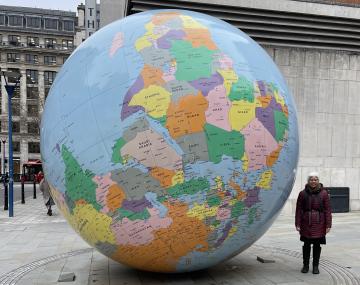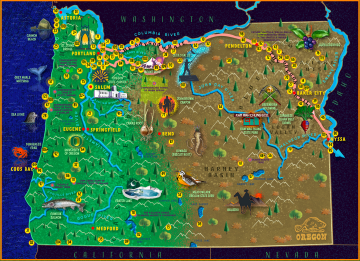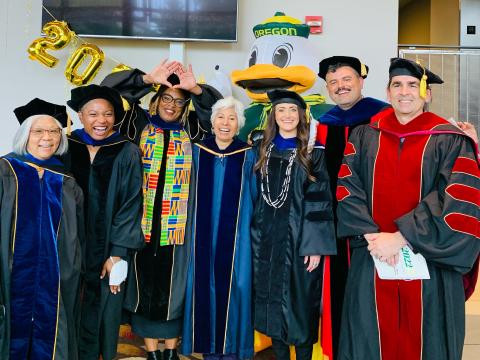Laura Pulido, a professor of Indigenous, race, and ethnic studies and geography at the University of Oregon, has been named to the American Academy of Arts and Sciences.
Pulido’s work exploring the intersections of race, class, and environmental issues contributed to the formation and recognition of the field of environmental justice.
She joins a class of nearly 250 members, which includes World Central Kitchen founder José Andrés, news anchor Anderson Cooper, and voting rights activity Stacey Abrams. The academy, founded in 1780, brings together leaders who through their work contribute to the public good by addressing issues of national and global importance.
Pulido also has received an honorary fellowship from the Royal Geographical Society for her service to geography.
Environmental justice

Throughout her career, Pulido has focused on the relationship between race and class and how that relationship plays out in environmental issues. Pulido is fascinated by weaving together critical ethnic studies with research on racism and white supremacy, linking them together with geography.
Pulido’s doctoral dissertation explored environmental racism in Chicana/o communities, a concept that was just emerging at the time. She examined the experiences and perceptions of pesticides among farm workers in the San Joaquin Valley and the broader implications of environmental hazards in urban areas.
Her research has highlighted the failure of governments to address environmental justice, emphasizing that environmental racism is a fundamental product of capitalism. Environmental racism is a form of racism that includes siting polluting industries and waste dumps disproportionately in communities of color instead of those that are majority white.
“The devaluation of nonwhite bodies has been a central feature of capitalism for centuries and creates a landscape of differential value which can be harnessed in diverse ways to facilitate the accumulation of more power and profit, including through environmental harms,” Pulido said.
How communities organize themselves to challenge conditions of racial, economic and social inequality is another thread woven through Pulido’s research.
One of Pulido’s notable early works is her book Black, Brown, Yellow, and Left: Radical Socialization in LA. The book investigated the radical social movements in Los Angeles during the 1960s and ‘70s and how those movements still affect American political culture today.
Pulido followed that with A People’s Guide to Los Angeles, co-authored by Laura Barraclough and Wendy Cheng, which explored more than 100 alternative tourist destinations in Los Angeles that focus on people and events typically ignored by the mainstream. The book, which was aimed at a broad audience, sought to show people how to understand how power is embedded in the urban landscape.
The People’s Guide to Los Angeles project expanded to other cities, including New York, San Francisco, and Boston, providing a rethinking of urban landscapes and historical sites of class, gender, and racial struggle.
Cultural memory
Particularly noteworthy is Pulido's work on cultural memory—what a society chooses to remember, including through public monuments, memorials and historical markers—and its role in shaping national identity.
Currently a visiting scholar at the London School of Economics, she is exploring the fascist history of Italy and Spain and England’s history of colonization to understand how those countries narrate their difficult past. She hopes that those global insights will in turn inform research about how the United States narrates its racial past and settler colonization, which in turn has shaped the national identity.
“I would say that this country can never become united in a meaningful way unless it deals with the truth of its past,” she said. “To wish it away and pretend we can be united without doing that work is simply impossible. It may create discomfort, but it’s only working through discomfort that you reach truth and understanding.”

Her current U.S.-based project focuses on cataloging historical markers and how they serve as repositories for cultural memory. She noted the extent to which conquest is deeply rooted in American history. For example, the Colt Armory in Connecticut and a Louisiana Purchase survey marker in Arkansas include descriptions of history that glorify the concept of manifest destiny, westward expansion, and the taking of land from Native Americans.
“We are living in a moment of racial backlash, a recurring theme in U.S. history going back to Reconstruction if not before,” Pulido said. “The current administration is actively working to change this nation’s cultural memory. Taking down webpages about women and people of color’s military achievements, attempting to rename locations like the Gulf of Mexico and Denali, ending the Environmental Protection Agency’s environmental justice office, and removing the Black Lives Matter street mural in Washington, D.C. are recent examples.”
She explores the role of white nationalism and the far right’s influence in driving political agendas and its impact on environmental justice. She is interested in how right-wing ideologies intersect with environmental issues, particularly in the context of wildfires and climate denial.
Impact on future scholars
Looking ahead, Pulido plans to continue challenging dominant narratives and advocating for justice. But despite being recognized for her contributions to the public good, Pulido said mentoring young scholars continues to bring her the most joy.
In a full-circle moment, Pulido’s former mentee Tianna Bruno (Geography, PhD 2021) was recently honored with the Margaret FitzSimmons Early Career Award at the Cultural and Political Ecology Specialty Group of the American Association of Geographers annual meeting.
FitzSimmons served on the urban planning faculty at UCLA and environmental studies at the University of California, Santa Cruz. She was also Pulido’s graduate school mentor.
And Pulido continues to collaborate with students on projects that document the far right's influence on Latino communities striving to belong in America and the broader implications for environmental justice.
“I’m a nerdy scholar,” she said. “I want to get to the bottom of things and understand them. I hope that younger scholars can run with this information in ways I can’t imagine.”

